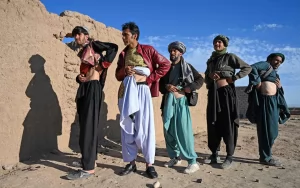
Difference in earning isn’t new. Where one part of the society enjoys all the luxuries of life, another part strives even to make ends meet. There’s still, but, a line between poverty and extreme scarcity. When that line is crossed, people get to take extreme steps. And this is what’s happening right now in a Taliban-led Afghanistan.
The blog image is a testament to the harsh reality that is faced by the Afghan population in today’s generation. Men in certain villages have no way to bring even a meager income and feed their children and families. They are selling their body organs, mainly kidneys, to stay alive amid a tight economy and Taliban-led governance.
The State of Illegal Organ Trading
Illegal organ trading has existed for centuries in various Asian countries. Countries like India and Afghanistan have been arguably the greatest market of illegal trading of organs. Organs are often acquired by force where people are kidnapped, killed, or extorted by criminals. But some also do it willingly, due to their poor state of finance. As a result, black markets of organ donations flourish in various parts of the world, and especially its Asian corners.
Illegal Organ Trading in Afghanistan
After the Taliban took over the country in 2021, its population has faced an extreme crisis. Unstable governance and a failing economy was enough to lead millions into the road of extreme hunger and poverty. Afghanis were left with little choices. They started selling everything they had. What started with selling belongings and financial assets has now come down to selling children and body organs.
“I had to do it for the sake of my children,” said Nooruddin, a 32-year-old Afghani from Herat, a city close to the border with Iran. “I didn’t have any other option. I regret it now. I can no longer work. I’m in pain and I cannot lift anything heavy.”
Kidney selling is so prevalent that a village in the western city has been nicknamed “One Kidney Village.”
Even the price range of these kidneys has gone down in the black markets. What was once sold for $3500 to $4500 is now fetching even less than half of the sum.
The state of Afghanistan and future of Afghanis
Peter Kessler, a UNHCR spokesperson, describes Kabul as: “What was once a really thriving central Asian city, no longer has vehicles on the roads. Shops are closed—people do not have money to buy anything. Street vendors have oranges and pomegranates, but rarely do people buy them.”
Afghanistan received much foreign funding and help from the international community. However, the funding froze when it was taken over. With practically zero aid and internal abuse of power, the country and its population is deteriorating faster than any other land on Earth.
Atrocities of the Taliban are now reaching every household. People are wary of running into them. They have also started individual house searches citing reasons of safety and treason.
“We are not happy… I don’t want them to enter our house, I don’t want them to see my sisters, I don’t want them to search my clothing cabinet and my documents. I don’t want them to disturb my mother,” said a Kabul resident.
No country or its people deserves this. We hope the situation improves in the future. If you are reading this blog, find some way to help them.